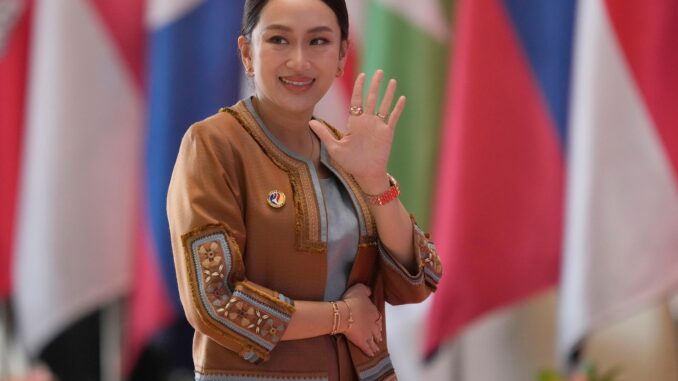
VIENTIANE, Laos — Chinese Premier Li Qiang called for deeper market integration with Southeast Asia on Thursday during annual summit talks where territorial disputes in the South China Sea are likely to be high on the agenda.
The 10-member Association of Southeast Asian Nations’ meeting with Li followed recent violent confrontations at sea between China and ASEAN members Philippines and Vietnam that raised unease over China’s increasingly assertive actions in the disputed waters.
Li didn’t mention the row in his opening speech at the summit talks but said that intensifying trade relations between Beijing and ASEAN — a market of 672 million people — are beneficial for the bloc.
“The global economy is still seeing a sluggish recovery, protectionism is rising and geopolitical turbulence has brought instability and uncertainty to our development,” Li said.
“An ultra large-scale market is our greatest foundation for promoting economic prosperity. Strengthening market coordination and synchronization is an important direction for our further cooperation,” he said.
ASEAN and China said they made progress in negotiations to upgrade their free trade pact and expect to conclude the talks by next year. Officials said the expanded pact will cover supply chain connectivity, the digital economy and green economy. Since the two sides signed the free trade pact in 2010, ASEAN’s trade with China has leaped from $235.5 billion to $696.7 billion last year.
China is ASEAN’s No. 1 trading partner and its third-largest source of foreign investment — a key reason why the bloc has been muted in its criticisms of Chinese actions in the South China Sea. ASEAN leaders have repeatedly called only for restraint and respect for international law.
ASEAN members Vietnam, the Philippines, Malaysia and Brunei along with Taiwan have overlapping claims with China, which claims sovereignty over virtually all of the South China Sea and has become more aggressive in its attempts to enforce its claims. ASEAN members and China have been negotiating a code of conduct to govern behavior in the strategic waterway for years but progress has been slow. Sticky issues include disagreements over whether the pact should be binding.
Chinese and Philippine vessels have clashed repeatedly this year, and Vietnam said last week that Chinese forces assaulted its fishermen in a disputed area of the sea. Beijing has said it was defending its offshore territories. China has also sent patrol vessels to areas that Indonesia and Malaysia claim as exclusive economic zones. The Philippines, a longtime U.S. ally, has been critical of other ASEAN countries for not doing more to get China to back away.
The U.S. has no claims in the South China Sea but has deployed Navy ships and fighter jets to patrol the waterway and promote freedom of navigation and overflight. China has warned the U.S. not to meddle in the disputes.
But U.S. Secretary of State Antony Blinken, who will arrive in Vientiane on Thursday for the meetings, is expected to raise the issue of China’s aggression in the sea, officials said.
ASEAN leaders, who held a summit among themselves on Wednesday, also separately met with new Japanese Prime Minister Shigeru Ishiba and South Korean President Yoon Suk Yeol before convening an ASEAN Plus Three summit along with China.
ASEAN elevated its ties with South Korea to a “comprehensive strategic partnership” at the summit to boost cooperation. Yoon said the partnership will help both sides “create a new future together.”
Ishiba separately pledged to boost the Japan-ASEAN relationship by providing patrol vessels and training on maritime law enforcement, strengthening economic security through financial and other support and bolstering cybersecurity.
“Japan shares principles such as freedom, democracy and the rule of law, and would like to create and protect the future together with ASEAN,” he said.
The bloc will also hold individual talks with dialogue partners Australia, Canada, India, the U.S. and the United Nations that will culminate in an East Asia Summit of 18 nations including Russia and New Zealand on Friday.
Former ASEAN Secretary-General Ong Keng Yong said that despite challenges in addressing disputes in the South China Sea and the Myanmar civil war, ASEAN’s central role in the region is undisputable.
“ASEAN and its diplomatic maneuvers have sustained the relative peace and progress of Southeast Asia to date. ASEAN will continue to be useful in that regard. Big powers cannot do what they wish in the region,” said Ong, who is now deputy chairman of the S. Rajaratnam School of International Studies in Singapore.
After the Myanmar army ousted an elected government in 2021, fighting there has descended into a civil war that has killed nearly 6,000 people and displaced more than 3 million. The military has backtracked on an ASEAN peace plan it agreed to in late 2021 and fighting has continued with pro-democracy guerillas and ethnic rebels. Less than half of the country’s territory is believed to be under the army’s control.
Myanmar’s top generals have been shut out of ASEAN summits since the military takeover. Thailand will host an informal ASEAN ministerial-level consultation on Myanmar in mid-December as frustration grows in the bloc over the prolonged conflict.


Be the first to comment